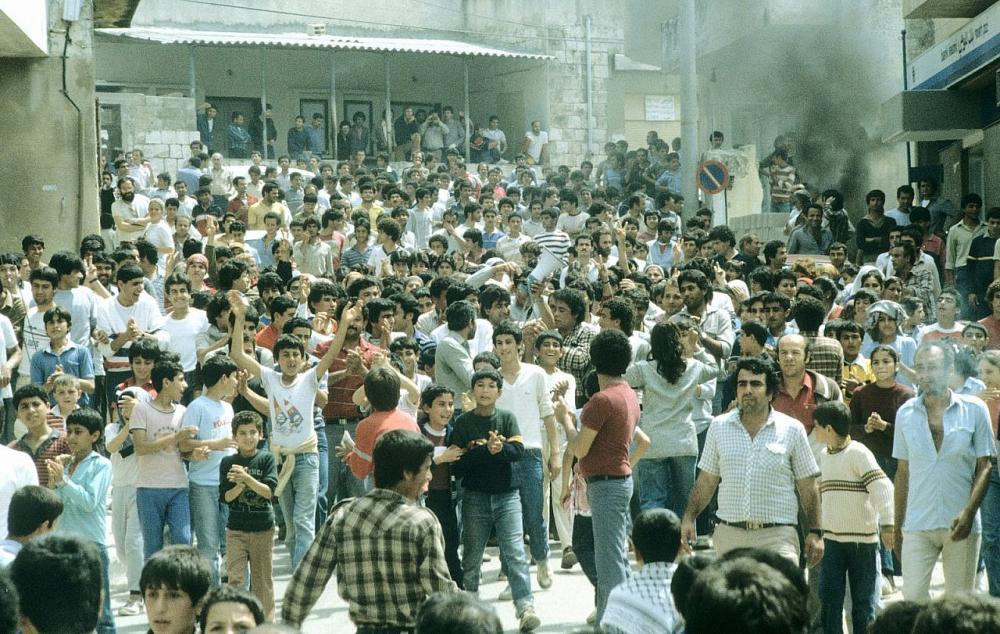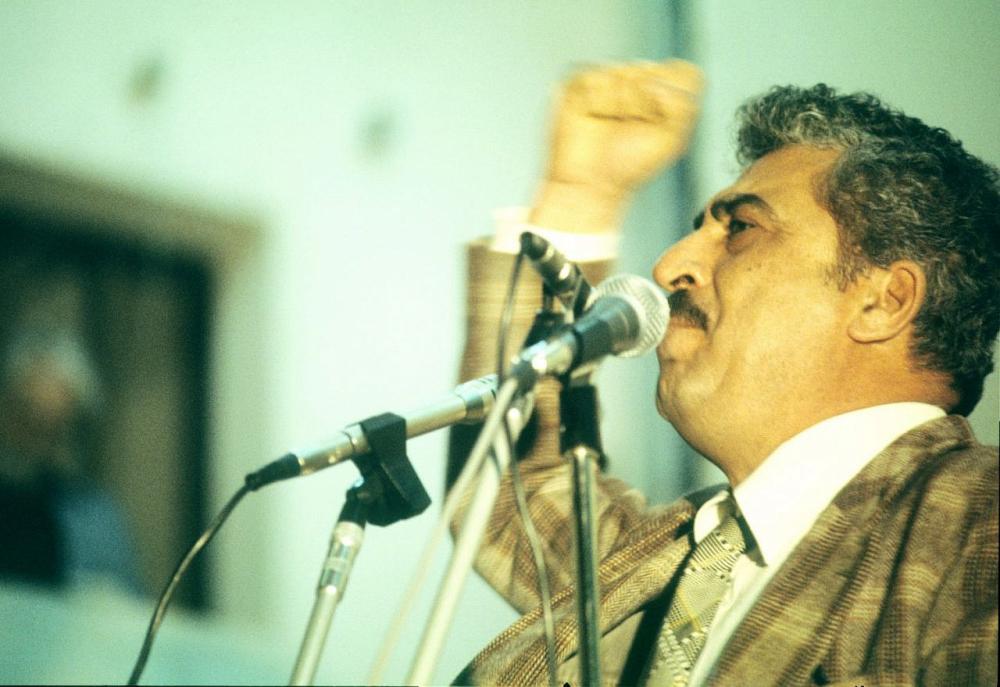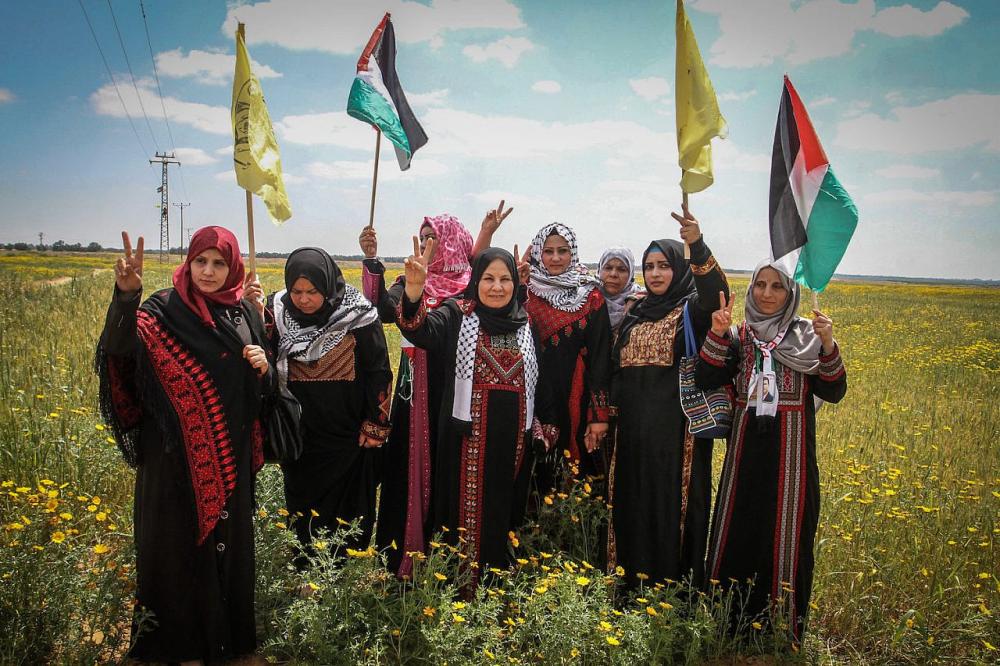March 30, 1976, in Tamra was a cloudy, cool day. Light showers intermingled between the clouds. That morning, I was standing a few meters away from the main street of the Galilee village, where dozens of people had gathered. Young members of the Israeli Communist Party tried in vain to disperse the gathering, claiming that the strike which had brought this group together required them to stay inside or near their houses, but nothing more.

Verbal disputes broke out between the two groups, but it did not distract them from noticing buses leaving the village bereft of passengers — a clear sign of a mass commitment to the strike. Suddenly, the young men began to whisper to one another, and their numbers increased.
Then we learned about the bloody events that unfolded in the villages of Sakhnin, Arraba, and Deir Hanna, where Israeli police and soldiers attacked protesters, leaving six Palestinian citizens dead.
A short while later, police cars and armored vehicles appeared from the western entrance to Tamra, and the young men on the street fled east toward the village center. There, near the main mosque and cemetery, a battle broke out between the stones of the angry youths and the bullets of the military forces — the likes of which the youths had never seen, and the adults had not experienced since 1948.

Palestinian citizens of Israel take part in annual Land Day protests, March 30, 1979. (Beni Birk / Photographer: Israel Press and Photo Agency (I.P.P.A.) / Dan Hadani collection, National Library of Israel / CC BY 4.0)
With the arrival of the news of the six martyrs, the searing rage and sadness of the people reached a boiling point. We understood, on that day, that we were facing an unprecedented event in the history of the Palestinians who remained inside Israel following the Nakba of 1948. But we did not realize at the time that this would also be a foundational moment for all the Palestinian people.
A victory for the self
The backdrop to the events of the first Land Day 47 years ago consisted of four main elements. The 1973 “Yom Kippur War” restored much of the Arab national honor that had crumbled following the fracture of the 1967 war, which had caused the Arabs across the region to lose their faith in themselves, in their leadership, and in their ability to respond to the challenges of the time. In this sense, the 1973 war was a victory for the self more than it was a victory over the other side.
Immediately after the war, the star of the Palestine Liberation Organization (PLO) began to rise. The 1974 Arab summit in Rabat recognized the PLO as the sole legal representative of the Palestinian people, which was followed by Chairman Yasser Arafat’s famous “olive branch” speech at the UN General Assembly in November of that year.
Meanwhile, the National Front, which was established in the territories occupied by Israel in 1967, waged extensive popular struggles across the West Bank and Gaza Strip. The pace of these struggles increased and their scope expanded over the following years. They led, among other things, to Israel’s expulsion of important national figures beyond the borders of historical Palestine, which in turn provoked a fierce response from Palestinians in the occupied territories.

Palestinian author and politician Tawfiq Zayyad speaks at a rally on Land Day, March 30, 1979. (Beni Birk / Photographer: Israel Press and Photo Agency (I.P.P.A.) / Dan Hadani collection, National Library of Israel / CC BY 4.0)
Inside Israel, two important events took place in 1975. The first was the establishment of the Committee for the Defense of the Land, which created a leadership to resist the Israeli government’s criminal policies, including its plans to expropriate more Palestinian land, particularly in Kufr Qasem, Sakhnin, Arraba, and Deir Hanna; it was this body that would issue the call for a general strike on Land Day the following year. The second is the victory of the Nazareth Front, led by Tawfiq Zayyad, in the Arab city’s municipal elections in the winter of 1975 — just a few months before Land Day, in which Zayyad would come to play a central role.
But the most important of all, the first Land Day was the achievement of a young Palestinian generation of that time, born after the Nakba of 1948, that had begun to raise its head and respond to their political challenge, ready to pay a price — even if the price was in blood. It is this new generation of young Palestinian women and men who fought in the battles of 1973; who promoted the status of the PLO; who brought Zayyad to the mayorship; who guaranteed the commitment to the strike on March 30, 1976; and who stood with stones and their chests against the Israeli bullets that day.
Unprecedented determination
Land Day was a social and political earthquake for Palestinians in Israel. And like any earthquake, it was followed by aftershocks.
After that day, the relationship between Palestinian citizens and the state was never the same. On the one hand, the fear of the Shin Bet and other repressive authorities decreased, and on the other, Palestinians gained more courage to stand up for their rights and their national identity.
Shortly afterward, the Democratic Front for Peace and Equality — more commonly referred to as Hadash in Hebrew or Jabha in Arabic — was established as an Arab-led offshoot of the Israeli Communist Party, becoming one of the most dominant political forces in Palestinian society in Israel for decades.
Furthermore, the relationship between the Palestinians in Israel and the wider Palestinian national movement also changed radically. The former merged their interests with the national goals and struggles as promoted by the PLO, and the national movement, in turn, welcomed and embraced them. The nationalist Abnaa al-Balad (“Sons of the Homeland”) movement also strengthened its position among the Palestinians within Israel.
I was among the participants of the general strike on that first Land Day nearly five decades ago. At the time, I was a high school teacher in Tamra, and a student at Haifa University. I felt and saw with my own eyes the unprecedented determination and enthusiasm among my Palestinian peers, in spite of the grave concerns over the wrath they might face from the state.
Two days before Land Day, the head of Tamra’s local council, Sheikh Zaki Diab, arrived at the school, where he threatened to punish any teacher or student who supported or participated in the protest. He had made the same threats two days earlier at a meeting of the heads of Arab local councils, where Tawfiq Zayyad made very clear, with thunder in his voice, that “the people have decided to strike.”

Palestinians take part in a demonstration on the anniversary of Land Day, near Khan Younis in the southern Gaza Strip, on March 30, 2016. (Abed Rahim Khatib/ Flash90)
Ironically, it was Diab who was among the first to be punished, after his coalition partners in Tamra deposed him just a few days after Land Day. Diab, unfortunately, did not understand the difference between courage and recklessness, and did not understand the consequences of swimming against the tide of history. And the tide was overwhelming.
After that first Land Day, the Palestinians in Israel became braver, more daring, and more willing to sacrifice for their rights and identity. And that has remained ever since.
A version of this article was first published on Arabs48 in Arabic and Local Call in Hebrew.
Dr. Said Zeedani is associate professor of philosophy at Al-Quds University. He is the former director general of the Independent Palestinian Commission for Citizens’ Rights.
Support journalism against apartheid. Become a member of +972 Magazine. We rely on YOUR contribution to expose and resist injustice in Israel-Palestine.


Spread the word